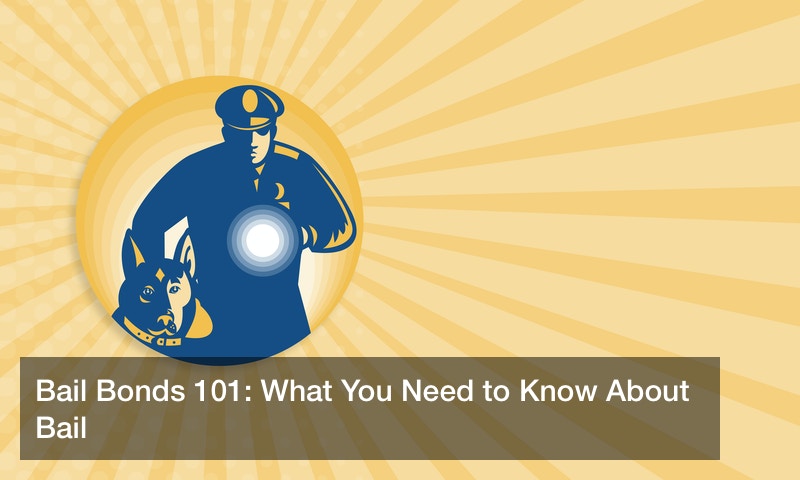
If you cannot afford to post cash bail, you may want to consider the available bail bond resources. With the advent of technological advancements, people can now get information within a fraction of a minute by surfing the web. You must be aware that you will likely have to pay a fee to the bond agent. And, if you fail to appear in court, you may lose your money or property.
Make sure that you understand your responsibilities before signing a bond agreement. Also, ensure you know what various legal terms in the bail process mean. There are terms such as bail custody, bail case hearing, and bail terms, amongst other vocabularies you should know in the bail process.
Another thing to keep in mind is that not all crimes require bail cash or bond. When arrested, it is vital to know if the crime is bailable. For example, minor traffic violations typically do not require bail. If it is your first time undertaking the bail process for an assault offense, consider finding out the bail conditions for common assault before signing the contract with a bail agent.
If you are arrested, it is important to consult with an experienced criminal defense attorney as soon as possible. Your attorney can help you understand your legal rights and options, including whether bail is required in your case.
Are you worried about everything that goes into dealing with felony bail bonds and appeal bonds? Are you curious about bail bond resources that might be available in your neighborhood? Do you need guidance with protecting your rights and responsibilities while working with local bail bonding services? To get answers, your local bail bondsmen in your area can give you the guidance you need to get through the process and get the results you want and need.
Your bail bonding pros will be able to walk you through the process of bail bonds debt collection and bail bond interest rate do’s and don’ts that may come into play for your unique situation. If you need bail cash or bond assistance, contact your local bail and bond pros, and you will be set to get the best services possible. For all of your questions, from ‘bail bonds how does it work for my unique situation’ to ‘can I post bail without using a bondsman’ the local bonding agent can provide the best assistance available to you. Contact the pros today to get started!
Have you found yourself in a situation where you need to raise cash to bail yourself or a loved one out of jail? These things happen, and when they do, most people are not informed about what bail is all about. The outcome of bail hearing cases can either be positive or negative. If the judge grants you bail, it comes with conditions. However, the most important rule is that you show up in court on the day of trial for your hearing. If the crime is severe, a judge may refuse to grant the accused bail. Also, if they believe one is likely to commit an offense, they can be denied bail. However, on some occasions, one may be granted bail in a nonbailable offense, which can only be done by the court.
As legal matters are complex, working with an attorney always helps. For instance, most accused people are not familiar with bail extended meaning. If more time is needed for investigation or gathering evidence, bail can be extended. Suspects will, however, be given the date to return, and if they fail, they risk criminal sanction. Another benefit of working with an attorney is that they are aware of 24 hours bail services and can get you out of jail at any time. As for being granted bail during the trial, the court will consider the criminal history plus the severity of the crime and decide if they will allow or deny bail.
Many people have negative misconceptions about bail. They believe it is just a tool that is used to get rich people out of jail, so they do not have to pay for their crimes. However, this is not necessarily the case. It also helps many people who have been falsely accused of crimes. In addition, it only allows for a temporary release from jail, on the condition that the person makes his or her required court appearance.
If you do not know a lot about bail, it is possible that you have a lot of questions that you want to ask of someone who works for a bail bond service. For example, you might wonder, how can I find out if someone is still in jail? In my area, how do bonding companies work? Who can tell me how to find out who bailed someone out of jail? Is it possible for someone to explain how to find out who bonded someone out of jail? Most of the time, a professional in this area will be able to answer these questions for you. You can also do some research on your own. It is a good idea to be familiar with this topic, just in case you or someone you love needs to be bailed out of jail at some point.
Rarely do humans think or look forward to getting arrested. However, it is imperative to equip oneself with the necessary knowledge, including the laws of the land. A bail bond agency or corporation stands in the defendant’s place and provides a surety that he/she will appear in the consecutive hearings without fail. The surety can be in terms of cash, a pledge, or property. The bond agent must have a written agreement with the court before the defendants’ release.
Nonetheless, it’s vital to understand the bailout of jail definition if you or your loved ones find yourselves in such dire situations. Information needed to fill in bail paperwork includes;

• Seriousness and nature of the offense
• Likely sentence
• Strength of the evidence
• The defendants’ associations and community ties.
• The previous record of the defendant being granted bail.
In cases where the police are unable to decide on releasing the accused, he or she is taken to court for the judge to decide. Bail hearing cases are like short trials, and the judge can choose to let the defendant out on bail. However, not all bail judgments are successful. In cases where the crimes are severe, such as rape, murder, and manslaughter, the accused remains in jail till the trial date where the jury determines their innocence or guilt.

Updated 3/4/21
It is very difficult to know when it the appropriate time to talk to a bail bonds consultant or reach out and find out about bail bondsmen services. The court systems can be confusing, and a bond is not always needed. For many, it is an extremely difficult field to navigate. Some do not even know the bail out of jail definition to make sure you are getting the right one.

Courts are complicated and if you or your loved one are in a situation that needs one, it is important to understand not only what you are getting into but what the steps are to get what you need. If anything, the court system can be unforgiving when it comes to late submissions, incorrect fees, and the like. It is a system that moves, and you need to know what to do if you must work with it.
This article was written to explain to you not only the difference between the different types of bail bonds that are available but when it might be the appropriate time to use it and bail bondsman job duties to give you an idea what to expect.
Life can get messy. Worst-case scenarios happen and when they do you need to be ready so you can make the best out of a bad situation.
That includes things like needing a bail bond. We don’t like thinking about the possibility of ending up on the wrong side of the law, but if it were to happen to you or a loved one, you’d want to be prepared.
The scary truth is that many of us don’t even know basic bail bonds 101. Many of us can’t describe the different types of bail bonds, where we’d get them, or even why we’d need them. Here, we’ll try to break this down into simple terms and teach you all you need to know about bail bonds.
What Are Bail Bonds?
Even when people know a little about bail bonds services, they often don’t know what bail bonds are or what kinds of bail bonds exist. This is essential bail bonds 101, so we will explore it here.
In the simplest terms, bail bonds let a defendant leave detainment with some conditions attached. In many ways, it is an agreement between a defendant and the court. The defendant has to pay the bail set by the court or stay in detainment.
However, it is not always possible for the defendant to pay some or all of the bail. This is when they might get a bail bond that covers the part of the cost they can’t afford. The goal is to ensure that the defendant returns for their trial later. The bond will be held by the court and returned when the defendant returns for their court appearances.

That is the bail bonds 101 explanation, but things get more complicated when you start digging deeper into the system. A bail bond sounds like a simple thing, but in reality, you might bail out of jail with one of several different types of bail bonds.
Types of Bail Bonds
The types of bail bonds include:
- Bail bond or surety bond
- Cash bond
- Unsecured or signature bond
- Own recognizances or personal recognizances bond
- Secured or property bond
A bail bond or security bond is the type of bond you might have already heard of, even without a strong understanding of bail bonds 101. It is simply when a bail bond agent pays a bail for someone. This is a common way for a defendant to pay their bail. However, it does come with fees. The bail bond agents will collect a certain percentage of the bond.
A cash bond is just the amount of bail the court sets. The defendant can pay this themself or through an agency. Interestingly, though, not all bonds are cash bonds. There are some types of bonds that are not monetary agreements in this way.
One example is an unsecured or signature bond. An unsecured or signature bond allows a defendant to get out of detainment without actually paying a bond. Instead, the defendant signs something and is released. However, they are still expected to return for required court dates.
An own recognizances or personal recognizances bond is similar to an unsecured or signature bond in that it allows someone to leave detainment simply on the condition they return for court dates. It does not involve actually paying a bond.
Finally, there are secured or property bonds. Instead of cash, this kind of bond involves property worth the bail amount. If a defendant uses this kind of bond and then doesn’t show up for court dates, the court might seize their property.
How Does a Bail Bond Work?
So that’s what a bond is, but how does it actually work?
That will depend on your location. Every jurisdiction can set its own rules about bail amounts and procedures. They can even make different decisions about who is eligible to get bail at all. No matter where you are, bail will probably be paid by credit card, debit card, money order or check to the clerk’s office. The clerk’s office is the one who will notify the relevant officials to say that bail was received and a defendant can be released.

This seems like simple bail bonds 101 on the surface, but it gets a little messier in practice than it seems on paper. Partially that’s because you are supposed to be able to get your bail money back.
A defendant released on bail who pays their bail and shows up for their court dates should get the money returned to them. However, it of course gets far more tangled than that when we are talking about the legal system.
For example, a town or city’s court may have a system in place to automatically return bail money after a defendant’s case is all settled. However, on the federal level, the court does not release bail money automatically. If you are involved in a federal case, you have to file a petition with the court after the conclusion of the case to get your bail money returned to you.
If you miss your court dates, you will not get your bail back. However, there are some extenuating circumstances the court will consider, though you may need to jump through some legal hoops in regard to that. It won’t be simple bail bonds 101 if you have a medical emergency that caused you to miss a court date, for instance.
The exact amount of your bail bond will depend on a slew of factors. Of course, the offense itself plays a role in setting the bail, but there are also important factors a judge will consider like your flight risk and familial and community connections. Those connections may weigh on your likelihood to appear in court so a judge will want to factor those in.
If you have a criminal history of any sort, that could stack up against you as well and cause your bail to be set higher. The court also looks at the seriousness of this and past crimes and the risk to public safety if you are allowed to post bail. Finally, your income and any assets you may own are taken into consideration.
While the factors combining to inform your bail amount are similar across jurisdictions, there’s no bail bonds 101 way to predict the ultimate outcome. There are too many factors that are specific to your individual situation to make a sweeping generalization about bail amount.
Where Can You Get a Bail Bond?
All of these different kinds of bonds can be confusing. They involve a lot of legal jargon that goes well beyond bail bonds 101. Plus, you may find yourself in a situation where you need to figure out bail very quickly.
One way a lot of people get a bail bond is through a bail bond agency. This is a very common way for defendants to go, despite the fees involved. It’s not required, of course. Defendants can certainly pay their own bail or have a loved one help them with bail. However, the reality is that bail is often too costly for most of us to just pay out of pocket when we suddenly find ourselves in need of it.
Another big advantage of going with a bail bond company is that they will be experts in the whole process. They are familiar with the ins and outs of bail bonds and can navigate some of the technicalities.
When someone is arrested, they will often get “booked,” which is the process by which things like a photo and personal information are collected. After getting booked, defendants can simply be released, but often people are not released until they post bail or even until after a bail hearing.
This is the point when you might need the help of a bail bondsman to get that bail posted so you can go free. Be aware that there are fees involved in going with an agency to get your bail posted. The fee will be different from one agency to the next, and sometimes depending on the specifics of your situation. Fees are often a percentage, such as 10% of the total bail.

Anyone who is stuck in holding wants to get out as quickly as they can. It’s difficult and sometimes frustrating when that hinges on getting bail posted. That’s why some agencies offer 24 hour bail bond services, to get defendants bonds as quickly as possible.
The main reason people often go with an agency for their bail bond is that they simply cannot afford the bail otherwise. Someone arrested for a serious offense also needs to think about things like a criminal law attorney, who might cost $100 to $300 per hour depending on their specialties. That is a very high fee, but one that is just as vital as the bond. By going through an agency, you can put aside other money for legal help and not have to spend it all merely on getting out of detention.
There is also a risk that comes with going with an agency. Above, we decided the bail bonds 101 version of getting your bail money returned after the conclusion of your case. That is trickier when you are dealing with an agency.
A bail bond company will certainly be concerned if you do not show up for your court dates. They may even use bounty hunters to help try to find you. These bounty hunters can arrest you for failing to show up to your court date. That might even be mentioned in your initial contract with the bail bond company.
It is hard to say exactly how this will work for every defendant. The rules around this change depending on where you live and what the laws in your jurisdiction are. It also matters where you are arrested and what jurisdiction the case itself takes place in. Therefore, there’s no simple and clear bail bonds 101 answer for how things will shake out if you don’t show up for court. It is certainly something you want to avoid though.
Why Might You Need a Bail Bond?
Those are the bare bones bail bonds 101 basics. However, it’s important to also consider why, when, and how you might end up in a situation where you or a loved one needs a bail bond. It can be a complicated and fast-moving situation, so it’s certainly one you want to be as informed about as possible.
There are many reasons why you might be detained and need to get a bail bond. The most common is a criminal offense of some sort. This is an incredibly broad category, though, spanning public intoxication to drug possession to identity theft. There are many, many more criminal offenses, but the particulars of what happens after someone is arrested for one of these offenses ranges from state to state.
Of course, the best-case scenario is not committing such an offense, but we know that is not the reality. If you or a loved one ends up on the wrong side of the law, you might need to think about a criminal defense attorney and bail bond.
A criminal defense won’t be the only thing you have to think about either. Say you just went to a walk-in medical care clinic because of a chronic condition you are managing. That won’t go away just because you are detained. Health conditions don’t disappear due to an arrest.

Even if you are taken to jail, you’d still need to think about health conditions. You might even hire disability denial attorneys alongside criminal defense attorneys depending on the specifics of your case and situation.
As you can see from this example, things can easily get extremely complicated depending on all the external factors going on in your life that complicated the bail bonds 101 matter.
The offense itself could get complicated and thereby complicate your bail cost and options. You might need the help of different kinds of attorneys, such as a commercial litigation attorney or another type of specialized attorney.
All of this adds up to a very complicated and serious situation that you now need to handle. The important thing is to just keep in mind what you know about bail bonds 101, stay calm and get the help you need so you can get through this.



